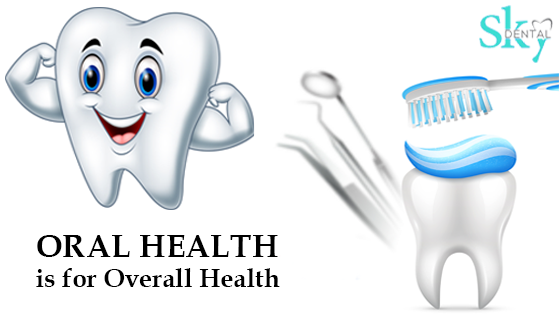Dental health is an essential part of your overall health and well-being. Poor dental health can lead to cavities and gum disease. It can also link with general health like heart disease, cancer and diabetes. A dentist can tell a can about your health by looking at your mouth. Things like bad breath, positioning of your teeth, condition of your gums and colour of your tongue can be the indication of health issues that may be affecting your entire body.
How dental health is connected to your overall health
Dental Health and Heart disease
According to several studies, Gum inflammation gives rise to heart disease and heart stroke. Because gum disease increases inflammation throughout the body which leads to cardiovascular disease. This is how your dental health is related to your overall health. As a result, practising good dental health can save you from major health issues.
Canadian Academy of Periodontology says, people with gum inflammation have a greater chance of heart disease and have a risk of fatal heart attack than people without the periodontal disease (gum disease). Visiting your dentist regularly to prevent gum disease may help you prevent cardiovascular problems in the future.
Oral health and pneumonia
There is a link between dental health and lung infection (Pneumonia) because people with gum disease have more raise in bacteria in their mouths. As a result, people with this disease are more likely to inhale germs that lead to lung infection like pneumonia.
Even a healthy mouth contains pneumonia, but bacteria in an unhealthy mouth can attack the lungs causing pneumonia. So, people who have a pre-existing lung problem like chronic obstructive pulmonary disease (COPD), gum disease may make it worse. As a result, the improvement in dental health can lead to a reduction in respiratory disease and fewer chances of occurring lung infections.
Pregnancy Compilations and Dental health
According to research, pregnant women with gum disease are more likely to develop gestational diabetes and deliver pre-term or low birth weight baby. Babies born with pre-term or with low weight have a greater risk of compilations like development problems, birth abnormalities, asthma, behavioural difficulties and may have greater risk of infant death.
Research says pregnant women with poor dental health may be at higher risk of delivering pre-term or low birth weight babies than pregnant women with good oral health. This is why regular check-ups with a dentist become even more important during pregnancy.
Oral health and diabetes
We all know that diabetes is more prone to gum disease. New studies suggest that serious gum disease may literally contribute to diabetes as it affects blood glucose control. According to the Canadian diabetes association, “If the case of gum disease, bacteria produce toxins that affect the carbohydrate metabolism in an individual cell. This periodontal bacteria can also increase insulin resistance and blood glucose levels.”
So, it is said that people who have higher levels of periodontal disease have a risk of developing diabetes over time compared to people without gum disease. It affects the ability of a patient with diabetes to control blood sugar.
cancer and dental health
We all know that smoking causes cancer. This hard-to-quit habit can lead to life-threatening illness. It can develop the risk of oral cancer, lung cancer, heart disease.
Surprisingly, independent of participants smoking status, the person with periodontal disease was linked with an increased risk of pancreatic cancer. This could be because of systematic inflammation or increased levels of carcinogenic compounds developed in the infected mouth.
Other conditions that may link to your dental health include eating disorders, cancers and immune system disorder that can cause dry mouth.
How can I protect my dental health
Practising good oral hygiene is the one and only way to protect your oral health.
Brush and floss twice at least a day
Use soft-bristled brush and toothpaste that containing fluoride
Use a mouthwash to control bad breath and to remove food particles left after brushing and flossing
Eat limited food and maintain a healthy diet
Avoid using tobacco
Replace your toothbrush for every 3 months
Schedule your dental check-ups and cleanings at your dental clinic.
This article is intended to promote understanding of and knowledge about general oral health topics. It is not intended to be a substitute for professional advice, diagnosis or treatment. Always seek the advice of your Prosthodontist ( dentist specialised in replacement of lost teeth) with any questions you may have regarding a medical condition or treatment.


